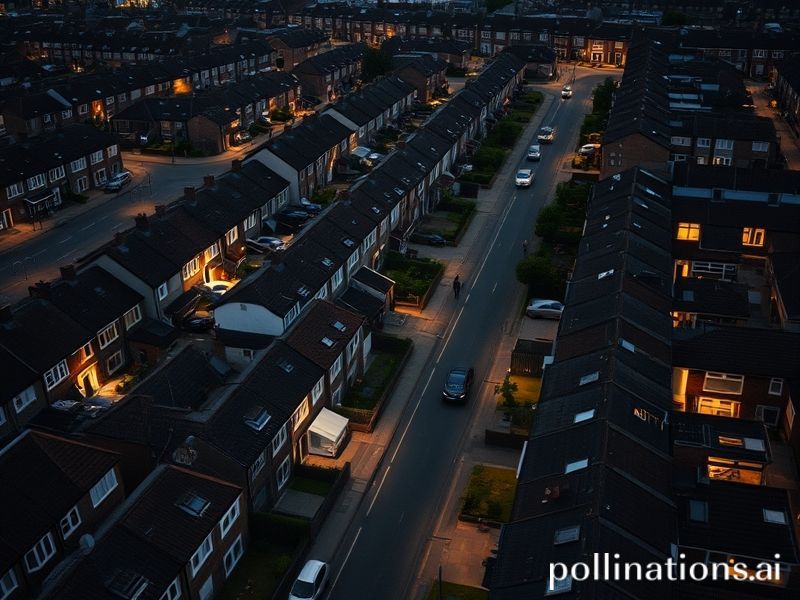Global Postcode Apartheid: How Your Zip Code Predetermines Your Entire Life
The Postcode Lottery: How Five Digits Decide Your Fate on This Spinning Rock
By the time you finish reading this sentence, three babies will have drawn the cosmic short straw and been born in postal zones where life expectancy is already wheezing twenty years behind the luckier infants wailing a few alphanumeric characters away. Welcome to the planet’s quietest caste system: the “people postcode,” a string of letters and numbers that quietly overrides passports, talent, and even the motivational quotes on your Instagram grid.
Start in Lagos, Nigeria, where the same government that can’t keep the lights on somehow manages to geo-tag every corrugated shack with precision that would make a Swiss watchmaker blush. Type “100001” into a courier’s app and a drone drops malaria meds atop a slum that Google Street View still thinks is a lake. Cross the Atlantic to Beverly Hills 90210—where the drones deliver truffle-flavored dog antidepressants—and you begin to suspect the universe sorts humans the way Amazon sorts packages: by barcode and budget.
Europe, never one to miss a chance at moral smugness, pretends postcodes are just logistical helpers. Try telling that to a teenager in Seine-Saint-Denis (93, for the connoisseurs of French disdain) who discovers her CV bounces back faster than a rubber check whenever she lists her address. Meanwhile, two digits away in the 75th, an intern named Clovis gets hired because his accent smells of money and his postcode smells of croissants. The EU Commission calls this “territorial cohesion”; everyone else calls it cartographic apartheid with better cheese.
Asia has turned postcode fatalism into a spectator sport. In Beijing, the “6” prefix is a golden ticket to schools that teach quantum physics with the same ease rural postcodes teach “Please don’t stick fingers in the threshing machine.” Parents divorce strategically, sometimes even marrying their own property deeds, just so little Xingxing can legally reside inside the halo of Haidian District. The government periodically promises to “rebalance” the system, which is Mandarin for “we’ll build one new elite school for every five luxury condo towers,” thereby ensuring the postcode premium appreciates faster than the kids it fails.
Down in Australia—continent-nation-hedge fund—the postcode paradox glows neon. The same postal area that houses Aboriginal communities without potable water also encompasses iron-ore mines whose daily profit could buy everyone a Evian bath for life. Miners fly in, fly out, and never learn the local postcodes exist, let alone that 6725 has a suicide rate that would make a war zone blush. The trucks roll on, addressed to Shanghai, where the steel becomes skyscrapers that themselves will one day get their own coveted postcodes, complete with rooftop infinity pools shaped like the continent they’re priced out of.
Aid agencies love to say “poverty is not destiny,” but postcodes are the rebuttal written in indelible ink. The UN’s Sustainable Development Goals might as well be a wish list to Santa once a zip code has its hooks in you. Want clean water, reliable power, a bank that doesn’t charge 30 percent interest on a loan for a goat? Try moving. Except borders are just postcodes with border guards, and they’re equally unmoved by your TED-talk-worthy grit.
Of course, technology was supposed to flatten all this. The cloud, we were told, has no address. Tell that to the algorithm that adjusts your insurance premium the microsecond your phone GPS drifts into the wrong neighborhood. Even death can’t unsubscribe: in South Africa, undertakers offer “relocations” so the deceased can be buried in a postcode that won’t embarrass the obituary.
So here we are, seven billion souls sorted like bulk mail, each of us a walking QR code of probability. The good news? Postcodes can change—right up until the moment they change you. The bad news? Someone has to redraw the map, and the pencil is usually held by whoever’s already living on the nice side of the line. Until then, keep your head down, your address vague, and if you’re planning to have kids, maybe consider a vacation in Tokyo 106-0031. The schools are excellent, the water won’t kill you, and the only price is whatever dignity you have left after bargaining with destiny for better digits.







